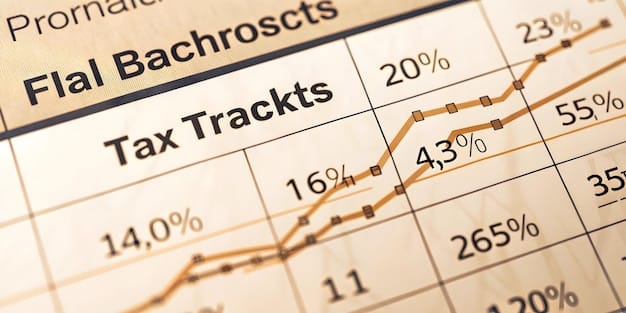New IRS Guidelines 2025: Maximize Your Tax Refund

Navigating the new IRS guidelines for 2025 involves understanding updated deductions and credits, crucial for maximizing your tax refund and ensuring compliance with the latest tax laws.
The tax season can be a stressful time, but with the new IRS guidelines for 2025, understanding the updates can help you maximize your tax refund. Knowing the updated deductions and credits will ensure you’re making informed financial decisions and complying with the latest regulations, potentially saving you money. Whether you’re a seasoned filer or new to the tax system, let’s explore the new IRS guidelines for 2025: maximizing your tax refund through updated deductions.
Understanding the Key Changes in IRS Guidelines for 2025
The annual updates to IRS guidelines can often seem overwhelming, but they are crucial for accurate tax filing. For 2025, several key changes are designed to simplify and clarify various aspects of tax law. Understanding these changes early can help taxpayers make informed decisions and avoid potential pitfalls.
Standard Deduction Adjustments
One significant area of change often involves the standard deduction. Every year, the IRS adjusts these amounts to account for inflation, ensuring that taxpayers aren’t unfairly burdened. Knowing the precise figures for single filers, married couples filing jointly, and heads of household is essential for accurate tax planning.
Changes to Tax Brackets
Similar to standard deductions, tax brackets also undergo annual adjustments. These brackets determine how much tax you owe based on your income level. Understanding these changes will allow you to better estimate your tax liability and adjust your withholding accordingly.
- Monitor Inflation Rates: Stay informed about the latest inflation data from reliable sources.
- Review Historical Changes: Look at how tax brackets and standard deductions have changed over the past few years.
- Use Tax Calculators: Utilize reputable online tax calculators to estimate your tax liability under the new guidelines.

In conclusion, understanding the key changes in IRS guidelines for 2025, such as adjustments to standard deductions and tax brackets, is crucial for accurate tax planning. By staying informed and utilizing available resources, taxpayers can navigate the new regulations effectively.
Updated Deductions for Individuals and Families
Beyond the broader changes, specific deductions available to individuals and families often see revisions. These deductions can significantly reduce your taxable income, leading to a larger refund or a lower tax bill. Staying abreast of these updates can lead to substantial savings.
Child Tax Credit Enhancements
The Child Tax Credit is a significant benefit for many families. Changes to the credit amount, eligibility criteria, or refundability can have a substantial impact on your tax situation. Knowing these enhancements can help you claim the full benefit you’re entitled to.
Education-Related Deductions and Credits
Education expenses can be a considerable burden, and the IRS offers several deductions and credits to alleviate this. Updates to the tuition and fees deduction, Lifetime Learning Credit, or American Opportunity Tax Credit could affect how much you can deduct or credit.
- Review Eligibility Requirements: Ensure you meet all the criteria for each deduction or credit.
- Keep Detailed Records: Maintain thorough documentation of all expenses related to the deduction or credit.
- Consult a Tax Professional: Seek guidance from a qualified tax professional to navigate complex education-related tax benefits.
By carefully reviewing and understanding these updated deductions, individuals and families can make informed decisions that potentially lower their tax burden. Regular updates and consultations with tax professionals ensure compliance and optimal benefit.
New Credits and Incentives for Green Energy and Home Improvements
The IRS often introduces new credits and incentives to promote specific behaviors, such as investing in green energy or making home improvements. These incentives can provide significant tax relief if you qualify, so it’s worth exploring them.
Residential Clean Energy Credit
The Residential Clean Energy Credit encourages homeowners to invest in renewable energy sources like solar panels, wind turbines, and geothermal heat pumps. Changes to the credit rate or eligible technologies can make these investments even more attractive.
Energy-Efficient Home Improvement Credit
This credit is designed to incentivize homeowners to make energy-efficient improvements to their homes, such as adding insulation, installing energy-efficient windows, or upgrading HVAC systems. Understanding the specific requirements and credit amounts can help you make cost-effective upgrades.

Considering the potential tax incentives, investing in green energy and home improvements not only benefits the environment but can also provide considerable financial relief. Stay informed about these credits and consult with professionals to maximize your benefits.
Changes Affecting Self-Employed Individuals and Small Business Owners
Self-employed individuals and small business owners face unique tax challenges, and the IRS often introduces specific changes that affect them. Staying informed about these changes is critical for compliance and maximizing tax savings.
Self-Employment Tax Updates
Changes to the self-employment tax rate, the threshold for paying self-employment tax, or the rules for deducting business expenses can all impact your tax liability. Keeping up with these updates ensures accurate reporting and compliance.
Pass-Through Deduction Rules
The pass-through deduction, also known as the qualified business income (QBI) deduction, allows eligible self-employed individuals and small business owners to deduct up to 20% of their qualified business income. Understanding any changes to the QBI rules is essential for claiming the full deduction you’re entitled to.
- Track Business Income and Expenses: Use accounting software or hire a bookkeeper to accurately record all transactions.
- Understand QBI Rules: Familiarize yourself with the eligibility requirements and limitations of the QBI deduction.
- Seek Professional Advice: Consult a tax advisor to ensure you’re taking advantage of all available deductions and credits.
For self-employed individuals and small business owners, staying current with IRS changes is crucial for both compliance and potential tax savings. Proper tracking of income and expenses, coupled with professional guidance, promotes financial well-being.
How to Prepare and File Your Taxes Under the New Guidelines
Navigating the new tax guidelines can be daunting, but with proper preparation and organization, you can file your taxes accurately and efficiently. Taking the time to gather the necessary documents, understand the changes, and choose the right filing method can make the process much smoother.
Gathering Essential Documents
Before you start filing, gather all the essential documents you’ll need, such as W-2s, 1099s, receipts for deductions, and records of any tax payments you’ve made throughout the year. Having these documents readily available will streamline the filing process and reduce the risk of errors.
Choosing the Right Filing Method
You have several options for filing your taxes, including using tax software, hiring a professional tax preparer, or filing by mail. Consider your comfort level with tax law, the complexity of your tax situation, and your budget when choosing the best method for you.
- Start Early: Begin preparing your taxes well in advance of the filing deadline.
- Use Reputable Software: Opt for well-known and trusted tax software programs.
- Double-Check Your Work: Review your return carefully before submitting it to catch any errors or omissions.
Proper preparation for tax filing under the new guidelines involves gathering essential documents, selecting the appropriate filing method, and dedicating time for thorough review. These steps ensure accuracy and compliance.
Common Mistakes to Avoid When Filing Your 2025 Taxes
Even with careful preparation, it’s easy to make mistakes when filing your taxes. Being aware of common errors and taking steps to avoid them can save you time, money, and potential headaches with the IRS.
Incorrectly Claiming Deductions and Credits
One of the most common mistakes is claiming deductions and credits that you’re not eligible for or calculating them incorrectly. Review the eligibility requirements and instructions carefully, and don’t hesitate to seek professional help if you’re unsure.
Failing to Report All Income
It’s crucial to report all sources of income on your tax return, including wages, self-employment income, investment income, and any other taxable income you received during the year. Failing to report all income can result in penalties and interest.
- Keep Accurate Records: Maintain organized records of all income and expenses throughout the year.
- Review Your Return Carefully: Double-check all entries to ensure accuracy.
- Seek Professional Advice: If you’re unsure about any aspect of your tax return, consult a qualified tax professional.
Avoiding common filing mistakes requires vigilance in record-keeping, accurate reporting of income, and careful review of your tax return. When in doubt, seeking expert advice can prevent costly errors.
| Key Point | Brief Description |
|---|---|
| 💰 Standard Deduction | Annual adjustments for inflation impact taxable income. |
| 👨👩👧👦 Child Tax Credit | Review eligibility and credit amounts for potential enhancements. |
| ⚡ Green Energy Incentives | Explore credits for renewable energy and home improvements. |
| 💼 Self-Employment Tax | Stay updated on tax rates and deduction rules for business owners. |
Frequently Asked Questions
▼
The standard deduction typically increases annually to adjust for inflation. Check the IRS guidelines for the specific amounts for single filers, married couples filing jointly, and heads of household for the 2025 tax year.
▼
To claim the Child Tax Credit, ensure you meet the eligibility requirements for the child and file Form 1040. Keep documentation such as the child’s social security number and records of childcare expenses, if applicable.
▼
Homeowners may be eligible for the Residential Clean Energy Credit for investments in solar, wind, or geothermal energy. Additionally, the Energy Efficient Home Improvement Credit covers upgrades like insulation and energy-efficient windows.
▼
Self-employed individuals should track all income and expenses, understand the qualified business income (QBI) deduction, and stay informed about any changes to the self-employment tax rate. Consulting a tax professional is highly recommended.
▼
Common mistakes include incorrectly claiming deductions, failing to report all income, and not double-checking your return for accuracy. Maintaining organized records and seeking professional advice can help avoid these issues.
Conclusion
Staying informed about the **new IRS guidelines for 2025: maximizing your tax refund through updated deductions** is essential for all taxpayers. By understanding the changes, preparing carefully, and seeking professional advice when needed, you can navigate the tax season with confidence and potentially increase your refund.





